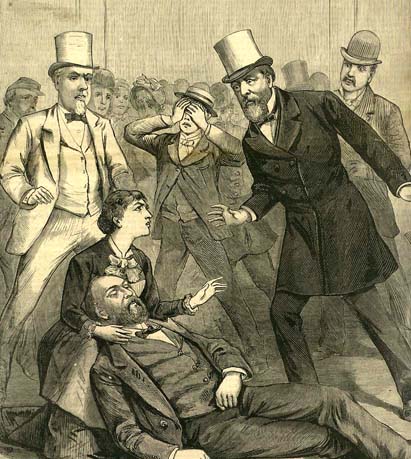President Garfield and General Thomas
James A. Garfield was elected President in 1880 and took office in 1881. Had he not been assassinated that year by a deranged job seeker, he would have served until 1885 and quite possibly until 1889. General Grant died in 1885 and while his influence was certainly waning by that time due to his uneven presidency and his financial scandals, the death-bed publication of his famous and well-written memoirs artificially draped his version of Civil War history with the ‘cloak of truth’. It would be treated as gospel by most historians from that time on.
In his memoirs, Grant was very often complimentary to officers when he knew their accomplishments could never threaten his reputation as the outstanding general of the war such as Sherman and Sheridan and very many of his defeated Confederate opponents. But, perhaps due to some quirk in his character, he was often unfair to officers whom he knew could be favorable compared to him in ability such as George H. Thomas and William S. Rosecrans.
Afterwards, only a person with the prestige of the Presidency could correct Grant’s intentionally false characterization of Thomas as a slow, plodding soldier with only defensive fighting qualities and no offensive capabilities whatsoever. Grant also used this rationale during the war to justify promoting General Sherman over Thomas which eliminated a rival, but probably caused unnecessary casualties as Sherman had even less skill in combat tactics than Grant and both were inferior to Thomas in planning and directing a major battle.
It should also be noted that several Grant cronies (Sherman, Sheridan and Schofield) led the army for 30 years after the Civil War. All of them demeaned Thomas (by then long dead) in their memoirs trying to make their record and Grant’s appear better at Thomas’ expense. Anyone in the army during those years who would refute this ‘official’ version of history would risk the loss of their career. For years after the war, General Sherman continually threatened officers with court-martial if they wrote war articles critical to his views. Essentially he censored all material written by the army.


General Garfield, as Rosecrans’ chief of staff, rode under fire to Thomas during the stand at the Battle of Chickamauga in September 1863, and that act may have helped make him president as it was predominately mentioned in his campaign literature.
He greatly respected and admired General Thomas. After Thomas’ untimely death, Garfield made a moving speech at a reunion of the Army of the Cumberland in November, 1870 at Cleveland entitled “The Life and Character of George H. Thomas”. 1,2
It is conceivable that, had he lived, President Garfield, who was not particularly fond of Grant, would have set the record straight on the accomplishments of General Thomas to the general public, and Thomas’ rightful place in history as one of the very best Union generals (perhaps second only to Grant) would have been secured.
As it was, with the passing of his army veterans, Thomas’ place in history was lost.
Notes:
1. Society of the Army of the Cumberland, Fourth Reunion, Cincinnati: Robert Clarke & Co, 1870, p. 55 -104
2. Hinsdale, B. A.: The Works of James Abram Garfield, Vol. I, Boston: James R. Osgood and Company, 1882, p. 643-673


